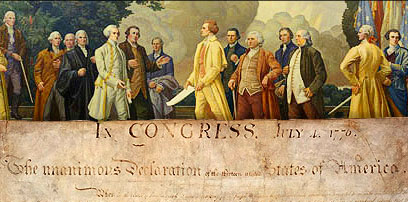
Even the night before the Fourth of July, it’s easy to obtain (where legal, of course) nearly an unlimited supply of fireworks, sparklers and other brilliant incendiary devices. Though such gunpowder-based confections stir delight in children and swelling patriotism in grown-ups, they belie the true state of affairs that General George Washington and his troops faced during the American Revolution more than 230 years ago.
But don’t take our word for it. You can see for yourself in this letter – and many others in our free Birth of America preview this month. Notice Washington’s distinctive signature as he endorses yet another plea to the Continental Congress begging for more gunpowder and ammunition.
In a time when it was customary to fill correspondences with platitudes, excessive praise and indirect requests, Washington makes the situation clear:
“… but there are operations, which may hereafter become practicable, and adviseable, that we should not be able to undertake for want of ammunition, unless we can derive a supply elsewhere.”
– General George Washington to the Continental Congress on 29 July 1779
What are the Papers of the Continental Congress?
The Papers of the Continental Congress are comprised of nearly 180,000 official records from the first three representative bodies of the original United Colonies and ultimately the United States of America. The First Continental Congress was formed in 1774 to address “intolerable acts” by the British Parliament.
It ultimately formed the Second Continental Congress in May 1775 which, through 1781, was famously responsible for the Declaration of Independence and many critical articles establishing the United States of America.
The Congress of the Confederation (1781-1789) immediately succeeded it after ratification of the Articles of Confederation and lasted through the end of the War for American Independence.
These are the important papers, letters, treaties, reports and assorted records—famous and obscure—relating to the formation of the United States government. While they contain exceedingly important reports, many of which may be well-known, they also contain much covering the day-to-day government of a fledgling country.
The original documents are currently held at The National Archives.
The Papers give you a privileged view that few other resources can. They show the dangers, debate and ultimate consensus that gave birth to the country we’ll be celebrating this Fourth.
How did Footnote get these online for the first time?
Getting nearly 200,000 documents digitized and online was not the hardest part – making them easily findable was.
Computers are getting good at reading typewritten text but handwritten text is nearly impossible for them – and many of us – to decipher.
Paying a staff to cross reference the millions of different names, dates, places and topics would have been too time consuming and expensive.
Instead we found a printed five-volume set of books that referenced each document in the microfilm and had our computers “read” that typewritten text. We then matched those descriptions up with our digitized collection and indexed that with our search engine and it worked.
For the first time, anyone can access, annotate, comment or share this great American collection.
Where do I start?
Here’s a small sampling of some of interesting finds:
- Read George Washington’s Acceptance as General of the Continental Army
- Read the first printed draft of the Constitution
- John Adams wrote to his wife, Abigail, “The second day of July, 1776, will be the most memorable epoch in the history of America. I am apt to believe that it will be celebrated by succeeding generations as the great anniversary festival…It ought to be solemnized with pomp and parade, with shows, games, sports, guns, bells, bonfires, and illuminations…” Read what Adams was referring to
- Read a letter by Thomas Jefferson
- A timeline of British colonization of America
- Franklin wanted to call America “The United Colonies of North America”
- Read about medical treatment during the Revolutionary War
- Read Adams’ report on European opinion of the Revolutionary War
- Read George Washington’s Acceptance as General of the Continental Army
- Read Washington’s resignation speech
If you find some interesting writings, please share them with us by either annotating the document in the Viewer or creating a Spotlight or Story Page with more details.
We look forward to your discoveries.





One thought on “Free for July: Read first-hand accounts of the birth of America”
Comments are closed.